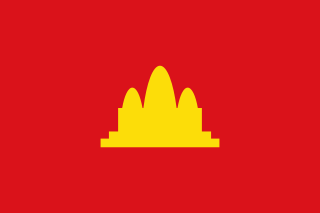
The Khmer Rouge is the name that was popularly given to members of the Communist Party of Kampuchea (CPK) and by extension to the regime through which the CPK ruled Cambodia between 1975 and 1979. The name was coined in the 1960s by then Norodom Sihanouk to describe his country's heterogeneous, communist-led dissidents, with whom he allied after the 1970 Cambodian coup d'état.

The Party of Democratic Kampuchea was a political party in Cambodia, formed as a continuation of the Communist Party of Kampuchea in December 1981. In the mid-1980s, it publicly claimed that its ideology was "a new form of democratic socialism", having ostensibly renounced Marxism–Leninism.

The Kingdom of Cambodia, also known as the First Kingdom of Cambodia, and commonly referred to as the Sangkum period, refers to Norodom Sihanouk's first administration of Cambodia, lasting from the country's independence from France in 1953 to a military coup d'état in 1970. Sihanouk continues to be one of the most controversial figures in Southeast Asia's turbulent and often tragic postwar history. From 1955 until 1970, Sihanouk's Sangkum was the sole legal party in Cambodia.

The Cambodian People's Party (CPP) is a Cambodian political party which has ruled the country since 1979. Founded in 1951, it was originally known as the Kampuchean People's Revolutionary Party (KPRP).
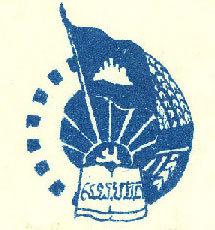
The People's Revolutionary Youth Union of Kampuchea was the youth organization of the Khmer People's Revolutionary Party. The organization was internationally known by its French name, Union de la Jeunesse Populaire Révolutionnaire du Kampuchéa (UJPRK). UJPRK was a member of the World Federation of Democratic Youth.
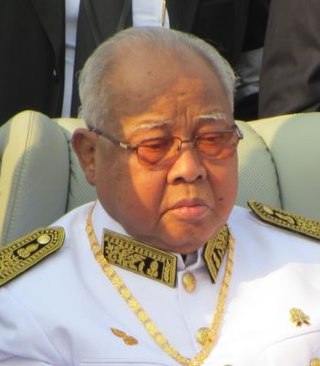
Chea Sim was a Cambodian politician. He was President of the Cambodian People's Party from 1991 to 2015, President of the National Assembly of Cambodia from 1981 to 1998 and President of the Senate from 1999 to 2015. His official title was Samdech Akka Moha Thamma Pothisal Chea Sim.
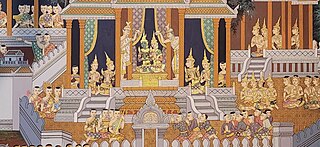
Media in Cambodia is largely unregulated and includes radio, television and print media outlets. Private sector companies have moved into the media sector, which represents a change from years of state-run broadcasting and publishing.
Chan Sy, also spelt Chan Si, was a Cambodian politician who served as the Prime Minister of the People's Republic of Kampuchea from 1982 until his death in 1984.

Son Ngoc Minh, also known as Achar Mean (អាចារ្យមាន), was a Cambodian communist politician and co-founder of the Kampuchean People's Revolutionary Party (KPRP), the predecessor to the Communist Party of Kampuchea.
Pen Sovan was a Cambodian politician and revolutionary who served as the Prime Minister of the Hanoi-backed People's Republic of Cambodia from 27 June 1979 to 5 December 1981. He also served as General Secretary of the Cambodia People's Revolutionary Party (CPRP) from 1979 to 1981. He was arrested and removed from office in December 1981 by the Vietnamese for irritating Lê Đức Thọ, the chief adviser to the PRK government. He was imprisoned in Vietnam until January 1992.
KPRP is a non-commercial educational radio station licensed to Honolulu, Hawaii, United States, which serves the Honolulu metropolitan area. It is currently owned by SummitMedia, LLC, pending a donation to the Raleigh-Wake Chapter of the National Alumni Association of Shaw University.

The People's Republic of Kampuchea (PRK) was a partially recognised state in Southeast Asia which existed from 1979 to 1989. It was a satellite state of Vietnam, founded in Cambodia by the Vietnamese-backed Kampuchean United Front for National Salvation, a group of Cambodian communists who were dissatisfied with the Khmer Rouge due to its oppressive rule and defected from it after the overthrow of Democratic Kampuchea, Pol Pot's government. Brought about by an invasion from Vietnam, which routed the Khmer Rouge armies, it had Vietnam and the Soviet Union as its main allies.
Keo Meas was a Cambodian communist politician. Keo Meas, then a fourth-year student at the Phnom Penh Teachers Training College, was recruited to the Indochinese Communist Party by Son Sichan in 1946. In 1950, he became a leading figure within the United Issarak Front. At the same time he was a leading figure in the Phnom Penh city unit of the ICP.

Cambodia was a farming area in the first and second millennia BC. States in the area engaged in trade in the Indian Ocean and exported rice surpluses. Complex irrigation systems were built in the 9th century. The French colonial period left the large feudal landholdings intact. Roads and a railway were built, and rubber, rice and corn grown. After independence Sihanouk pursued a policy of economic independence, securing aid and investment from a number of countries.
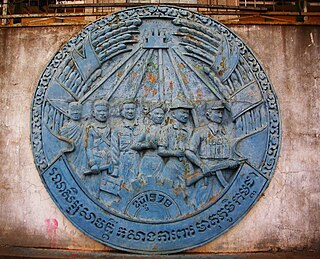
The Kampuchean United Front for National Salvation, often simply referred to as Salvation Front, was the nucleus of a new Cambodian regime that would topple the Khmer Rouge and later establish the People's Republic of Kampuchea (PRK).

Phnom Penh Royal railway station is a railway station in Phnom Penh, Cambodia. It is located next to the University of Health Sciences and the National University of Management as well as the Canadian embassy. This station was renovated and formally reopened October 22, 2010.
Tou Samouth, also known as Achar Sok (អាចារ្យសុក), was a Cambodian politician. One of the two founding members of the Kampuchean People's Revolutionary Party (KPRP), the other being Son Ngoc Minh, and head of its more moderate faction. He is mainly remembered for mentoring Saloth Sar, who would later change his name to Pol Pot.

General elections were held in Cambodia on 1 May 1981 and marked the establishment of the new, Vietnamese-backed, state of the People's Republic of Kampuchea (PRK). The Kampuchean People's Revolutionary Party was the only party to contest the election, and won all 117 seats. Voter turnout was reported to be 97.8%.

The Communist Party of Kampuchea (CPK), also known as the Khmer Communist Party, was a communist party in Cambodia. Its leader was Pol Pot, and its members were generally known as the Khmer Rouge. Originally founded in 1951, the party was split into pro-Chinese and pro-Soviet factions as a result of the Sino–Soviet split with the former being the Pol Pot faction, and the latter adopting a more revisionist approach to Marxism. As such, it claimed that 30 September 1960 was its founding date; it was named the Workers' Party of Kampuchea before it was renamed the Communist Party in 1966.












